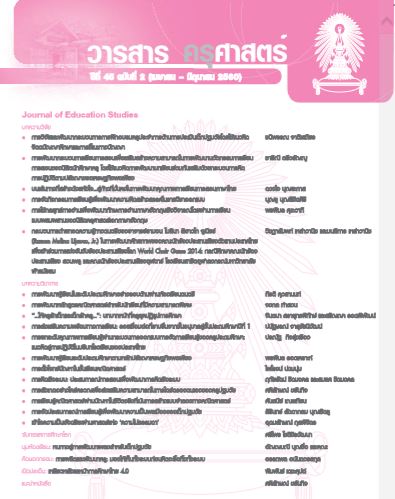การพัฒนาผู้เรียนระดับประถมศึกษาตามหลักปรัชญาเศรษฐกิจพอเพียง
Keywords:
หลักปรัชญาเศรษฐกิจพอเพียง, การพัฒนาผู้เรียน, ประถมศึกษา, SUFFICIENCY ECONOMY PHILOSOPHY, STUDENT’S DEVELOPMENT, ELEMENTARYAbstract
การจัดการศึกษาในระดับประถมศึกษาเป็นการศึกษาระดับพื้นฐานที่มุ่งพัฒนาคนให้เป็นมนุษย์ที่สมบูรณ์ ทั้งทางร่างกาย จิตใจ สติปัญญา ความรู้ และคุณธรรม มีวัฒนธรรมในการดำรงชีวิต และสามารถอยู่ร่วมกับผู้อื่นได้อย่างมีความสุข โดยที่ปรัชญาเศรษฐกิจพอเพียงเป็นแนวทางการดำเนินชีวิตและวิถีปฏิบัติที่พระบาทสมเด็จพระเจ้าอยู่หัวภูมิพลอดุลยเดชพระราชทานให้แก่ประชาชนชาวไทยโดยมีเป้าหมายคือ การพัฒนาที่สมดุลและยั่งยืนสามารถรับการเปลี่ยนแปลงทั้งภายนอกและภายในได้เป็นอย่างดี ทั้งทางด้านเศรษฐกิจ สังคม สิ่งแวดล้อมและวัฒนธรรม โดยยึดหลักทางสายกลาง ปรัชญาเศรษฐกิจพอเพียงมีองค์ประกอบ 3 ส่วนคือ ความพอประมาณ ความมีเหตุผล และการมีภูมิคุ้มกันที่ดี โดยมีเงื่อนไขพื้นฐาน2 ส่วน คือ ความรู้และคุณธรรม ซึ่งเป็นสาระที่ผู้เรียนจะต้องเรียนรู้เพื่อเป็นเครื่องมือหรือทักษะที่สามารถนำไปใช้พัฒนาสมรรถนะและคุณลักษณะอันพึงประสงค์อื่น ๆ ได้อีกต่อไป ดังนั้นปรัชญาเศรษฐกิจพอเพียงจึงเป็นหลักคิดหลักปฏิบัติที่สามารถช่วยให้เด็ก และเยาวชนผู้เป็นพลเมืองของประเทศสามารถพัฒนาคุณสมบัติอันพึงประสงค์ที่เป็นเป้าหมายของการศึกษาตามที่ได้กำหนดไว้ในหลักสูตรแกนกลางการศึกษาขั้นพื้นฐานพุทธศักราช 2551 จากความสำคัญดังกล่าวจึงจำเป็นอย่างยิ่งที่ครูผู้สอนระดับประถมศึกษาและบุคลากรที่เกี่ยวข้องจะต้องมีความรู้ความเข้าใจในองค์ประกอบของหลักปรัชญาเศรษฐกิจพอเพียง เห็นความสำคัญและคุณค่าของปรัชญาเศรษฐกิจพอเพียง เห็นแนวทางในการนำไปใช้ในบริบทของตนเอง รวมถึงในการน้อมนำหลักปรัชญามาใช้ในการจัดการเรียนรู้ให้แก่ผู้เรียน โดยสอดแทรกและผสมผสานในกิจกรรมการเรียนการสอน และกิจกรรมพัฒนานักเรียน อันส่งผลให้ผู้เรียนเกิดการฝึกฝนการใช้ชีวิตอย่างพอเพียง เรียนรู้การรู้จักพึ่งตนเอง รู้จักคิด รู้จักวางแผน และการปฏิบัติเพื่อพัฒนาตนและสังคม
Elementary education is a basic education level that aims to physically, morally, and intellectually develop people as complete human beings who could follow the culture of living, as well as striving to be a person who lives their life happily with others. The philosophy of the Sufficiency Economy has the central idea which could aid the youth of the country to develop the desired characteristics which were defined as the educational goal in the Basic Education Core Curriculum B.E.2551 (A.D. 2008). The Sufficiency Economy Philosophy was the way of life and practice that His Majesty King Bhumibbol Adulyadej bestowed to Thai people. The ultimate goal of the philosophy is to create a balanced and sustainable development path that suitably withstands internal and external changes regarding economic, social, environmental and cultural factors. The middle path approach is the underlying principle of the Sufficiency Economy Philosophy. The three essential components of the philosophy are moderation, reasonableness, and self-immunity. Besides these components, there are two vital conditions to make the philosophy work: knowledge and ethics, which comprise the learning area that learners will need to obtain as a tool or skills that could deeply enhance other desirable characteristics. The importance of such a study would be content knowledge and a thorough understanding of the philosophy among elementary faculty and staff. Not only a strong understanding but also a realization of the importance and values of the Sufficiency Economy which include the philosophy into teaching and learning in different contexts. This could be done by integrating the philosophy into different learning activities which may result in the practice of living life with sufficiency. This could lead to a powerful movement which could enhance the development of people and the society.




